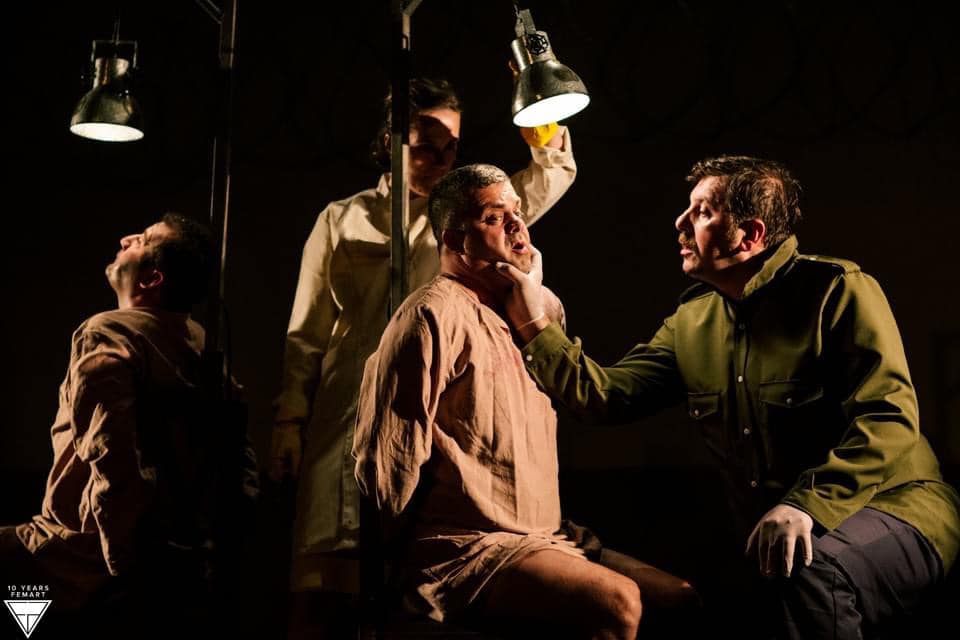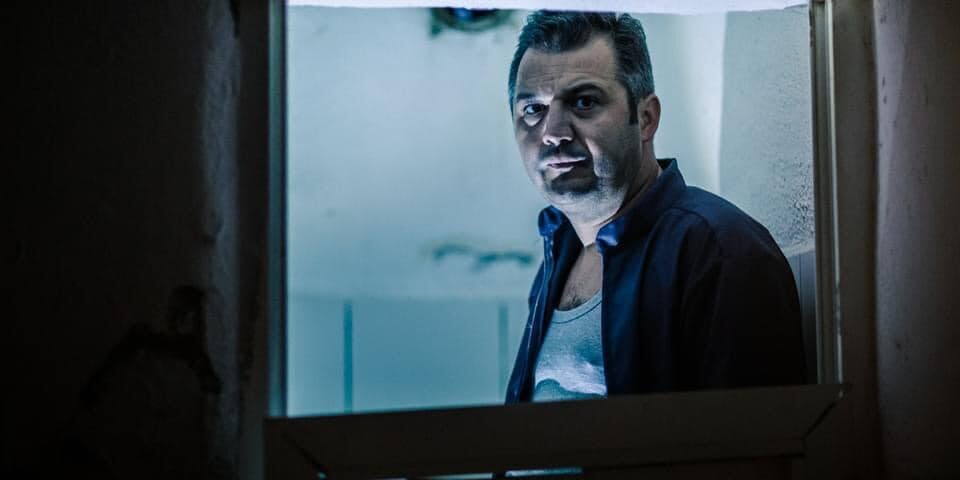Bokshi Theatre Company, premiere 23rd June 2022
Pristina Prison, a notorious building in the centre of the city, was built during the Yugoslav era in 1951. It housed thousands of political prisoners until 2016. Recently the prison was turned into a museum and was used for the first time for theatrical purposes this summer for the premiere of Death Hour.
As the audience walked down the narrow corridor of the former prison, unkempt men inside the cells, screamed for water and smashed their metal dishes relentlessly. Although my brain knew that it was all staged, I still walked a little bit faster.
The play masterfully merges stories based on true events, stories of political prisoners from the Yugoslav era and from communist Albania up until the Dubrava Prison massacres in 1999, when it is estimated that more than 100 Kosovan prisoners were killed and many were injured by Serbian security forces. During Albania’s communist regime, the communists tortured and killed thousands of Albanian citizens. Many were executed without trial and died as a result of the horrific conditions in prison.
New writers and dramaturgs Agnesa Mehanolli and Ulpianë Maloku have researched the stories of these political prisoners and merged them together, weaving the forgotten details into a fictionalised piece that is skilfully staged by director Ilir Bokshi. The choice of the former prison as a venue is perfect, the place is brimming with so much grim history that needs to be remembered.
Most of the play takes place in what used to be the prisoners’ exercise area. The surrounding barbed wire makes one feel confined even when looking up at the starry black night sky. The scenography is made up of simple, tables, and typical prison dishes, which increases the gloomy atmosphere. The music by Memli Kelmendi and lighting by Skender Latifi also significantly contributes to the atmosphere and the smooth transitions between the scenes.
At the start of the play, a nameless prisoner, played by Adrian Morina, is complaining that nobody came to beat him that day. This is unusual. Normally they didn’t miss a day.
Enver Hoxha, the communist leader who ruled Albania for 41 years, is also discussed. His atrocities against Albania’s populations are explored in the play by the means of short factual documentaries that showed statistics about the thousands innocent people who lost their lives during his regime.
Two cases of imprisonment under Albania’s regime are explored in the show, both of them absurd, yet inspired by real events. Tefta Tasi, a teacher from Albania (played by Albulena Bokshi) is interrogated by party officials for having spoken badly of an Albanian apple. Two friends are interrogated after being caught in a cafe discussing a dream with Enver Hoxha in it.
The questions the judges later ask of them are grotesque, and the accused have no way of getting out of the situation. The absurdity of this interrogation process makes one question the sanity of the people working in Hoxha’s judiciary and ruling system. Manipulated and brainwashed, it seems many are left with no capacity for critical thought. This is illustrated when we see two illiterate prison workers prepare the instruments they use to torture the inmates. The painful torture is then recreated in front of us. It shocks the audience. Can they go so far? Can human beings be this insensible?
These are hard scenes to watch, but necessary – they embed the cruelty of the system in everyone present. These tortures will stay in our memories long after the play is finished.

The play does not have a linear storyline, instead it consists of a number of scenes and stories. Two Fatmirs, one Fatmir from Kosovo (played by Morina) and one Fatmir from Albania (played by Arben Derhemi), meet on a border bridge. In the play, the two people consider the other’s country to be paradise and they both want to escape. Again they are both manipulated by the media and the ideology of the regime in each country.
This bridge is the Morini Bridge, which served as a dividing bridge between the people of Albania and Kosovo for 20 years, because of a disagreement on what was Albanian and what was Yugoslav land. Here people from both countries met each other on the bridge, while supervised by authorities from both sides.
Both hold completely wrong ideas about each other’s utopic lands, something which might comply with the views that people in Kosovo and Albania still have nowadays regarding the communist regime. There are those who think that people led a far better life under Hoxha’s regime, and there are others who will forever condemn him for his crimes against Albanians. The propaganda of the media still exists and people’s ideas about reality are still divided in so many parts of the world, even today – this is another reason for the necessity of a play like this in these times.
The prison scenes are disrupted when Lena appears on the stage, talking calmly and in a dream-like manner, about wanting to join her mom in heaven.
In between the tense scenes that are filled with anguish and sadness, her poetic speech is there to remind us about life and the peace we all need while we are still breathing. It also reminds us of death and its irrevocability.
But if one stops to consider the contrast between these scenes, one can notice how different they are. This peaceful scene also gives one the impression that living in that time was so horrible that one might prefer death instead. In this way, the physical space of the prison becomes a symbol of the prison-like life that many Albanians lived during Hoxha’s time, as well as the damage that such mental imprisonment does to human beings.
Credits:
Writers: Agnesa Mehanolli and Ulpiane Maloku
Director: Ilir Bokshi
Music Memli Kelmendi
Lighting Skender Latifi
Further reading: Adrian Morina interview: “I hope Kosovo can become more open-minded towards artists”
Florida is a lover of words, and of art in all its forms: fiction, poetry and drama.








